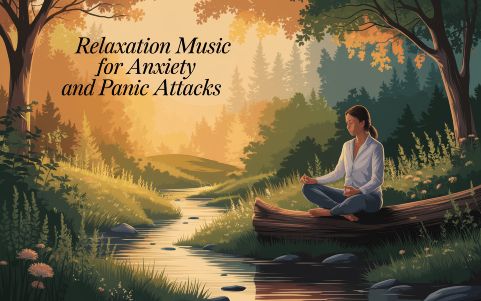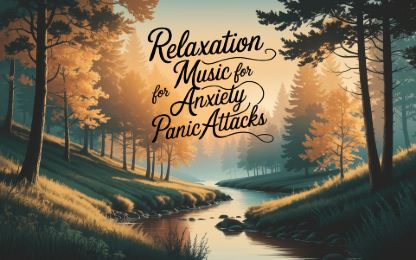Introduction
People suffer from anxiety disorders along with panic attacks in huge numbers every day. These mental conditions interfere with both daily schedules and resting patterns at night. Numerous individuals search for natural solutions to deal with their psychological health needs. Relaxation music operates as a highly effective method to calm down the mind. The following document delves into musical methods for anxiety reduction by providing guidelines for suitable track selection.
Explore more natural care tips on our site. Learn about herbal remedies for acne scars, try a DIY natural face mask for dry skin, manage oil with the best essential oils for oily skin control, or improve firmness using home remedies to tighten skin naturally. Also check our guide on organic face scrub for glowing skin.
How Music Affects the Brain
The rhythms in music control both the patterns of brain activity and cardiovascular functions. Placid musical selections help the nervous system achieve a relaxed state. People experience anxiety reduction together with slower breathing through this method. The activity leads to enhanced serotonin release which is a pleasurable chemical. Listening to soft music tends to make people feel eased down in only a short period of time. Regularity in music listening creates an enduring state of composure in one’s mental state.
Why Choose Music for Natural Relief
Music is non-invasive and drug-free. Any person can incorporate this natural remedy with their regular routine. The stress-relief method of music operates without causing unwanted effects like those experienced with medicine. Music offers a suitable auditory accompaniment for tasks and leisure experiences in your bed. Teams should opt for soft melodies to enhance stressful situations as background musical support. Many combine it with breathing or meditation.
Types of Music That Help Anxiety
Music does not consistently bring peaceful effects to the brain. High volume beats together with disruptive noises tend to enhance stress levels. Instead, choose:
- The natural sounds of rain together with the melody of ocean waves
- Classical music with soft piano
- Ambient sounds with low frequencies
- Tibetan singing bowls
- Instrumental guitar or flute music
The mentioned music styles create the most effective results when used against anxiety and panic.
Best Times to Listen
Music designed to create relaxation requires the right moment for it to achieve its purpose. Try these routines:
- In the morning for a calm start
- During breaks to release tension
- Before bed to sleep better
- Using the music during panic attacks provides you with stability
- Writing down your thanks in a journal brings additional peacefulness to your life.
Short-time exposure to peaceful music helps both concentration levels and emotional state enhance rapidly.
Building a Calming Playlist
A personalized playlist is a tool which keeps the atmosphere relaxed. Users should select relaxing tracks from multiple genres. Soft piano should combine with nature sounds and ambient music. The volume should be set at a low level and should provide a soothing experience. Change your playlist content each month to maintain its enjoyable impact.
Using Music With Deep Breathing
The integration of music together with breathing exercises makes the individuals calmer. Take breaths for four seconds at a time. Hold for four more. Exhale slowly for eight seconds. Repeat for five minutes. The best listening tracks for this practice should have no lyrics. Natural relaxation training happens as a result of this method.
Relaxation Music and Sleep
Anxiety creates difficulties for numerous persons when they attempt to fall asleep. Music helps quiet the mind. Select a musical playlist with steady and repetitive music rhythms. Avoid loud or fast tracks. The music should begin playing thirty minutes before you go to sleep. Home remedies for natural skin tightening should be part of your self-care practice that you use alongside other remedies.
Music and Meditation Practice
The practice of meditation increases the therapeutic benefits that arise from listening to music. When exercising use tracks and soft sounds as musical elements. Find a secluded spot with your eyes facing downward. Direct your focus on breathing as music provides background sounds. This strengthens your mind-body connection. Daily practice builds resilience against stress by continuously working on reduction of stress levels.
Choosing the Right Environment
The best musical experience happens when there is minimal environmental turbulence. Dimming the illumination level should be combined with selecting relaxed seating. Aromatherapy combined with DIY natural face masks for dry skin will improve the experience. The complete relaxation routine benefits from these helpful practices. Cell phone usage and loud background noises should be avoided as much as possible.
Music Therapy for Panic Attacks
The practice of music therapy continues to grow popular with practicing therapists. This method provides necessary assistance during panic attack situations. The appropriate track functions to reduce both breathing rate and heart rate. The use of calming music is a common practice in therapeutic sessions as practiced by mental health professionals. Consult with a professional regarding the process to include this treatment method in your current care plan.
Finding Relaxation Music Online
Many platforms offer relaxation music. You should start by checking out YouTube in addition to Spotify along with unique applications. Check out music playlists which specifically use terms such as “calm,” “stress relief” and “anxiety aid.” Select music that has received good reviews and incorporates soothing elements in the title. Songs containing abrupt shifts or loud volume should be kept away from relaxation activities.
Using Headphones or Speakers
Headphones provide a personal experience. The devices both create an obstructed environment and present deep auditory signals to listeners. You should use noise-cancellation headphones to maximize sound quality. The output quality of speakers delivers suitable audio for group events or when setting the ambiance of a room. Test each method separately to determine which one gives you the most suitable outcome.

Explore more natural care tips on our site. Learn about herbal remedies for acne scars, try a DIY natural face mask for dry skin, manage oil with the best essential oils for oily skin control, or improve firmness using home remedies to tighten skin naturally. Also check our guide on organic face scrub for glowing skin.
Herbal Remedies and Relaxation Music
Listening to music alongside herbal treatments provides double benefits for acne scar treatment. When the skin remains calm it affects the mind similarly. Herbal chamomile tea should be used by listeners during their music listening moments. The combination creates a stress-reducing approach that naturally treats your skin condition.
Pairing Music With Daily Activities
Playing relaxational audio helps with regular activities. Listening to music becomes a useful strategy during kitchen tasks and work and housekeeping activities. The balance of your nervous system remains stable when you implement this practice. Stretch or breathe for a few additional minutes. Slight modifications establish perpetual tranquility.
Music for Children With Anxiety
Music provides relaxation benefits to children the same way it does to adults. Lullabies and sounds from nature work best for relaxation. Music plays before night rest and following school sessions. Auditory tunes establish an environment where children feel protected and relaxed. Music builds kids’ emotional toughness which persists in the long term.
How Music Supports Mental Health
Relaxation music builds emotional resilience. The music practice guides mental operations into temporary stoppage followed by breathing periods. The continuous use of relaxation music works to lower panic symptoms alongside chronic stress. Music functions as an effective tool that strengthens the benefits of both physical exercises and journal writing therapy.
Scientific Evidence on Music and Anxiety
Research indicates that music therapy successfully decreases patients’ levels of anxiety based on test scores. Hospitals often use music in recovery rooms. Brain relaxation happens when people listen to soft music according to magnetic resonance imaging results. The research findings verify music as a treatment which delivers immediate anxiety relief in addition to sustained anxiety relief.
Popular Apps for Relaxation Music
Three popular relaxation apps are Calm, Headspace and Insight Timer. Such applications offer hand-picked sleep and anxiety-focused playlist sections. The daily habit formation requires setting notifications to prompt listening at specific times. Some offer offline access and timer features. Regularly change your musical styles among your playlist selections.
Evening Routine With Music
You should develop a nightly practice to help you get better sleep each night. Heat showers and face care routines serve as an excellent beginning of your night-time schedule. The correct essential oils designed for oily skin control should be used to achieve relaxation. Play your playlist for 20 minutes. You should keep a gratitude journal while reviewing your day. One can achieve mental clarity through this method in preparation for night rest.
Pros and Cons of Relaxation Music for Anxiety
| Pros | Cons |
|---|---|
| Non-invasive and natural | May not work alone for severe anxiety |
| Easily available and affordable | Needs consistent use for results |
| Boosts mood and focus | Distraction if music is too upbeat |
| Supports sleep and mental clarity | Not a replacement for professional help |
FAQs
The utilization of music proves beneficial for stopping panic attacks.
Yes. Music with a slow pace has a positive effect on both your breathing and heartbeat rate. Using music right before panic signs emerge will provide the most beneficial outcomes.
What is the correct duration for playing relaxing music on a daily basis?
A time period between ten and twenty minutes serves as the optimal duration. Extend your sessions of music exposure according to your stress needs.
Using headphones will provide me with better results.
Yes. Enhanced personal space together with external noise reduction is provided through headphone use. They deepen the calming effect.
Music combines well with breathing exercises as an effective technique.
Absolutely. Music helps people maintain timing and focus while performing their breathing exercises. Use instrumental tracks without lyrics.
The music I listen to potentially causes increased anxiety symptoms.
Change the genre or track. Avoid loud or complex sounds. Choose slow, repetitive patterns instead.

Final Thoughts
Listening to relaxation music provides a straightforward method to handle anxiety and panic conditions. This technique fits within any schedule and improves your personal care practices. The addition of home remedies paired with gratitude journaling will boost the natural skin tightening effects when used with this method. Use home-made natural face masks designed for dry skin whenever you need to remain calm during your relaxation sessions. Using music enables the proper selection of essential oils for aromatherapy treatment of oily skin conditions.
Your mind requires no extensive amount of time in order to reach a state of peace. Devoting oneself to a few moments of peacefulness daily will result in enduring transformative outcomes. You should use your playlist to heal yourself. Stay consistent. Stay kind to your mind.
